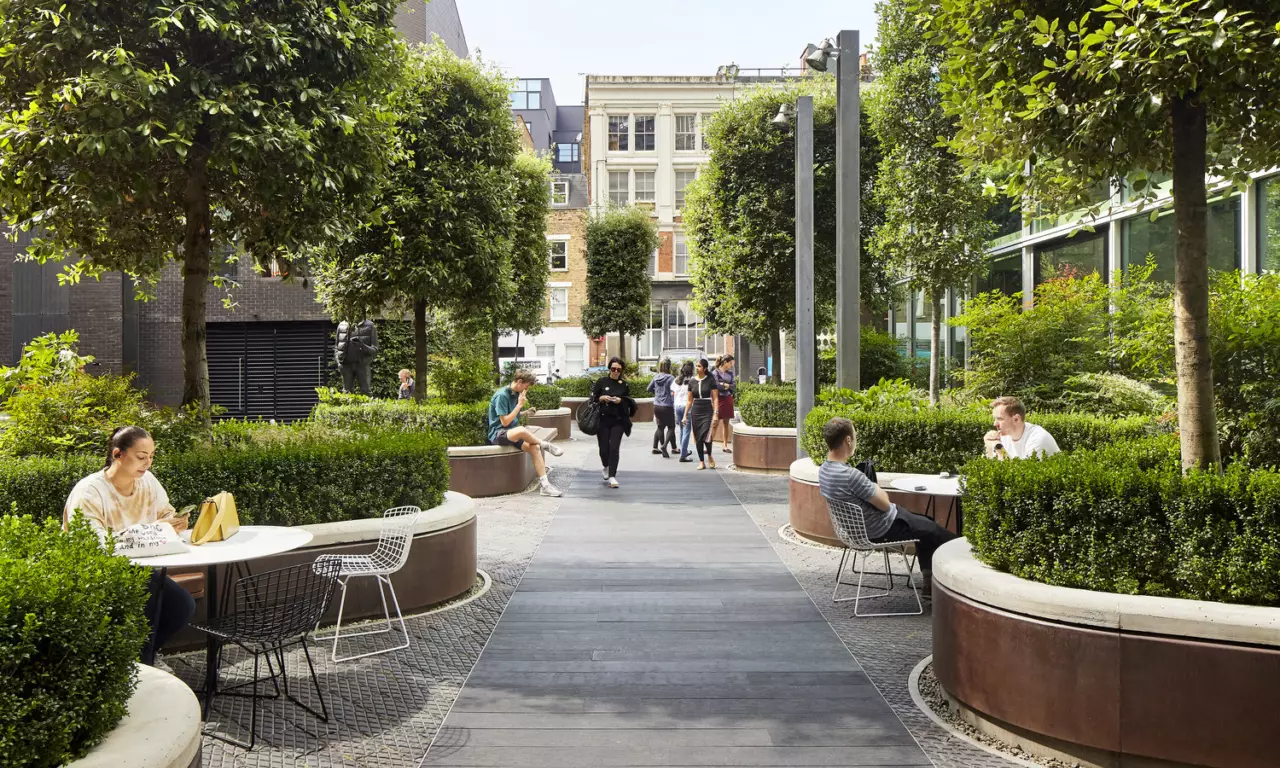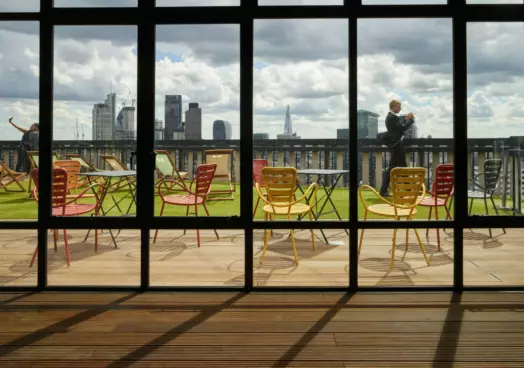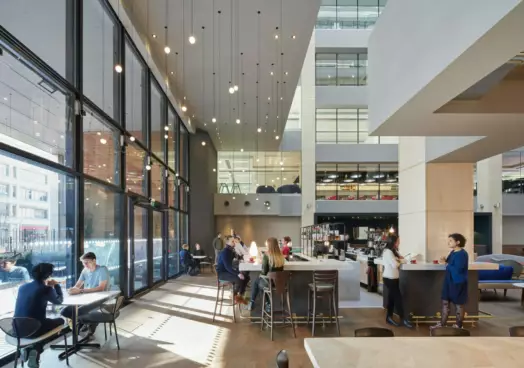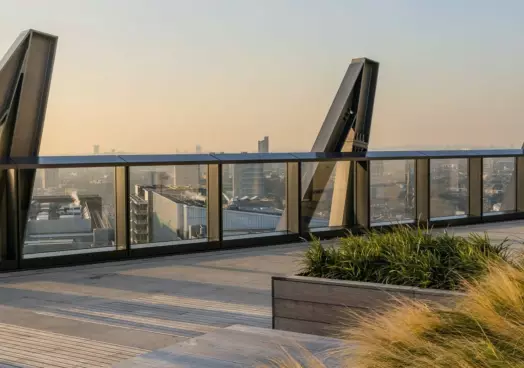Responsibility
2021 was for us the busiest period for investment activity since 2007, we continued to progress and extend our environmental, social and governance (ESG) agenda. All of which is making us stronger, more inclusive and more innovative.
ESG Pillars
Environment
Sustainability is an important value indicator for our business, and by using our unique approach we see our spaces let quickly and on better terms
Social
Developing and maintaining strong relationships within the communities in which we operate is an essential part of our management approach.
Governance
At Derwent London, we do not view corporate governance as an exercise in compliance but as an evolving and core discipline which generates value for our stakeholders and underpins our success.
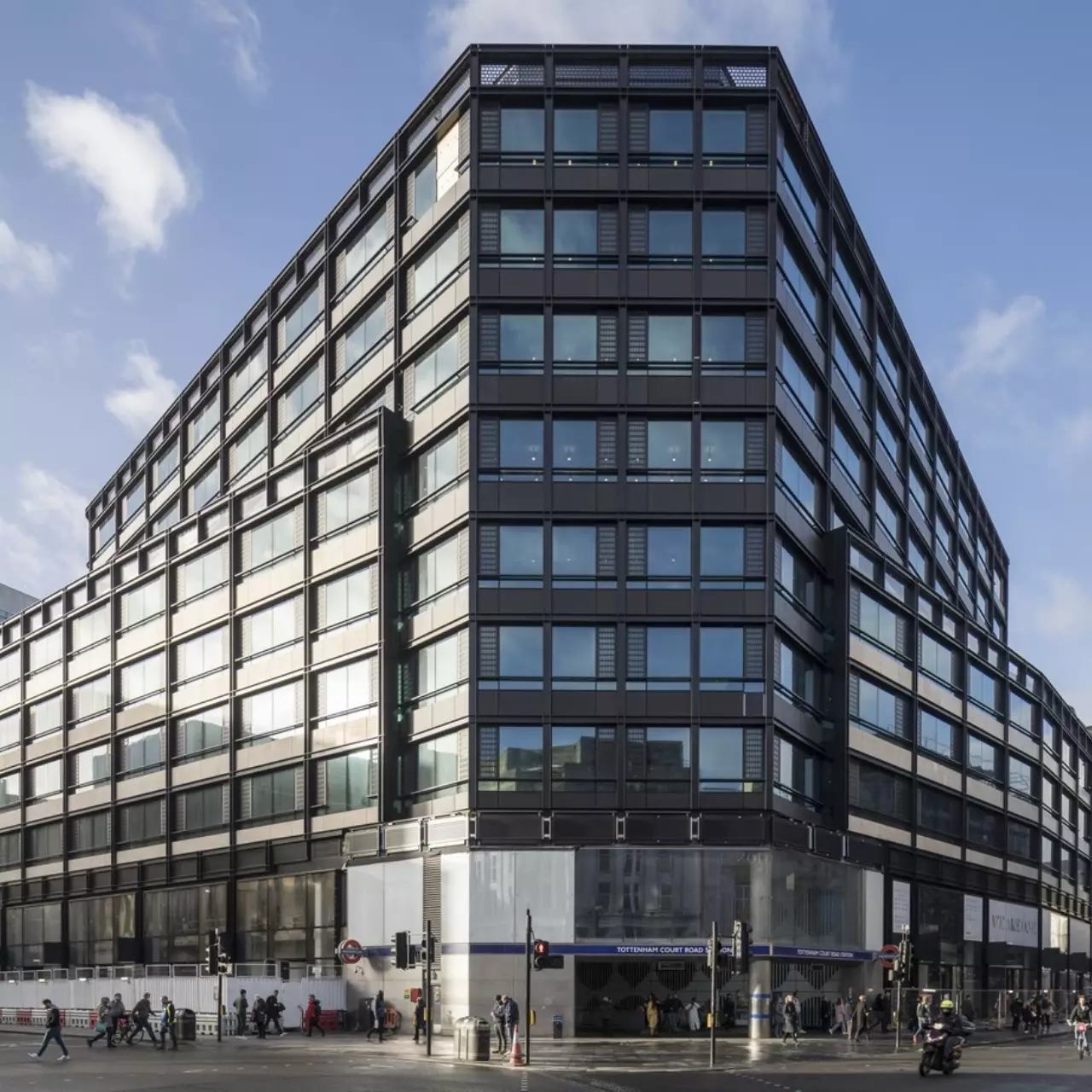
We’re building a business that’s net zero – balancing the carbon that we put in against that which we take out. In 2020, we pledged to reach that landmark within ten years, and we published our Net Zero Carbon Pathway to show how we are going to get there.
Developments: An eye for detail
One of the cornerstones of our efforts is everything we do to reduce the carbon footprint of our new developments and refurbishments: cutting their embodied carbon (the emissions generated by every production and construction process required to complete a scheme), as well as minimising their energy and emissions in operation.
In 2020, we completed 80 Charlotte Street W1 in Fitzrovia, a 377,000 sq ft mixed-use scheme and our first all electric and net zero carbon development. Other major schemes in the pipeline will follow suit, but our targets for decarbonising apply just as much to the many small and medium-sized properties in our portfolio as they do to the larger ones.
In 2021, we were able to add four more properties to our all electric list. As part of the refurbishments of 6-8 Greencoat Place SW1, 88-94 Tottenham Court Road W1, 19-23 Fitzroy Street W1 and 3-5 Rathbone Place W1, all in Fitzrovia and completed in 2021, we replaced the existing gas-fuelled heating and hot water systems with state-of-the-art equivalents such as air source heat pumps (ASHPs), powered by renewable electricity. Likewise, Francis House SW1 in Victoria and 43 Whitfield Street W1 in Fitzrovia are comprehensive refurbishments with new, all electric heating systems, both due to complete in H1 2022 and representing 71,100 sq ft.
To inform the Net Zero Carbon Action Plans that we are putting in place for each property and drawing on the all-electrification appraisal conducted across our portfolio in 2019, we are mapping out the decarbonisation route for specific buildings from now to 2030. We are also running assessments of embodied carbon and operational energy for our smaller projects and looking into new measures and technologies for reducing both, across the portfolio. For more on embodied carbon and operational energy, go to the Net Zero Carbon section of our report, and for this year’s numbers, head to the Data section.
We are raising our expectations for our new and modernised properties all the time, and it’s essential that our consultants and contractors have crystal-clear guidance on what those expectations are. Our newly updated Responsible Development Framework (RDF) sets out the guiding principles for our project pipeline: the actions, deliverables and responsibilities of consultants and contractors at each stage of a development, and the reporting frameworks they should use to help meet the Project Sustainability Plan created for each scheme.
The RDF aims to set the sustainability performance bar higher with each project. The update puts more emphasis on embodied carbon reporting into the framework and sets more demanding minimum performance targets in areas such as water consumption.
From 2021, all new-build projects and major refurbishments are required to achieve, as a minimum, a 4.5-star NABERS UK rating. NABERS UK is an assessment tool originally developed in Australia for rating the energy performance of buildings, and which is now being administered by the Building Research Establishment (BRE) as a benchmark system in the UK. Derwent London is one of the first developers in the UK to adopt the system and was part of the group that brought it to the UK. For commercial office buildings, NABERS UK provides a rating from one to six stars, with six stars representing market-leading energy performance.
Alongside our latest requirements – minimum BREEAM Excellent rating, EPC rating of ‘A’ for new-builds and at least a ‘B’ for all refurbishments, and LEED Gold mark for new-builds – the 4.5-star NABERS rating adds to an already stringent suite of sustainability standards that our building projects must attain, shifting the focus on to ongoing performance.
Cutting
carbon
Progress on our developments over 2021 - continuing to cut embodied carbon minimising energy and emissions in operation.
Cutting
carbon
Progress on our developments over 2021 - continuing to cut embodied carbon minimising energy and emissions in operation.
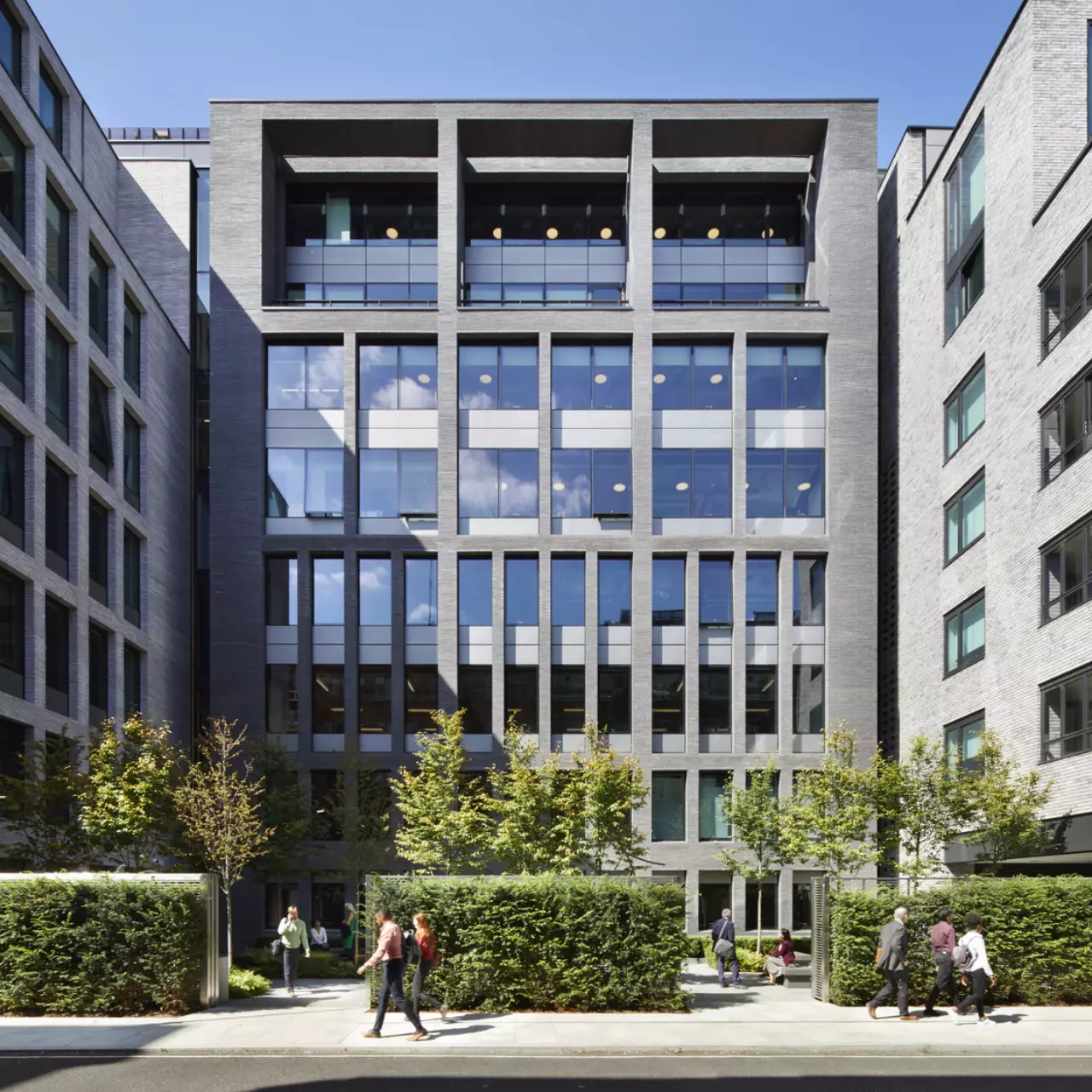
80 Charlotte Street
W1
This mixed-use scheme completed in June 2020 and comprises 322,000 sq ft of offices, 43,000 sq ft of residential (10,000 sq ft affordable housing), 12,000 sq ft of retail and a new public realm park.
The project is our first all electric scheme with all the central heating and cooling provided from air source heat pumps, significantly reducing carbon emissions.
The offices are now fully pre-let following lettings to Arup (133,600 sq ft, £9.7m pa), The Boston Consulting Group (164,150 sq ft, £14.0m pa), Elliott Wood (11,000 sq ft) and Lee & Thompson (13,000 sq ft).
Sustainability
- All electric
- Air Source Heat Pumps on the roof provide heating and cooling and therefore avoiding the need for traditional gas boilers which are more carbon intensive
- 80m2 of solar thermal panels located on the roof will heat the domestic hot water reducing the building’s requirement for grid electricity
- Designed to achieve 28% lower embodied carbon intensity than the RICS benchmark, with estimated embodied carbon of 850kg CO2e per m2, versus the RICS Building Carbon Database (offices) average benchmark of 1177kg CO2e per m2
Standards
- BREEAM Excellent (achieved at design stage)
- Targeting LEED Gold
- Targeting EPC B
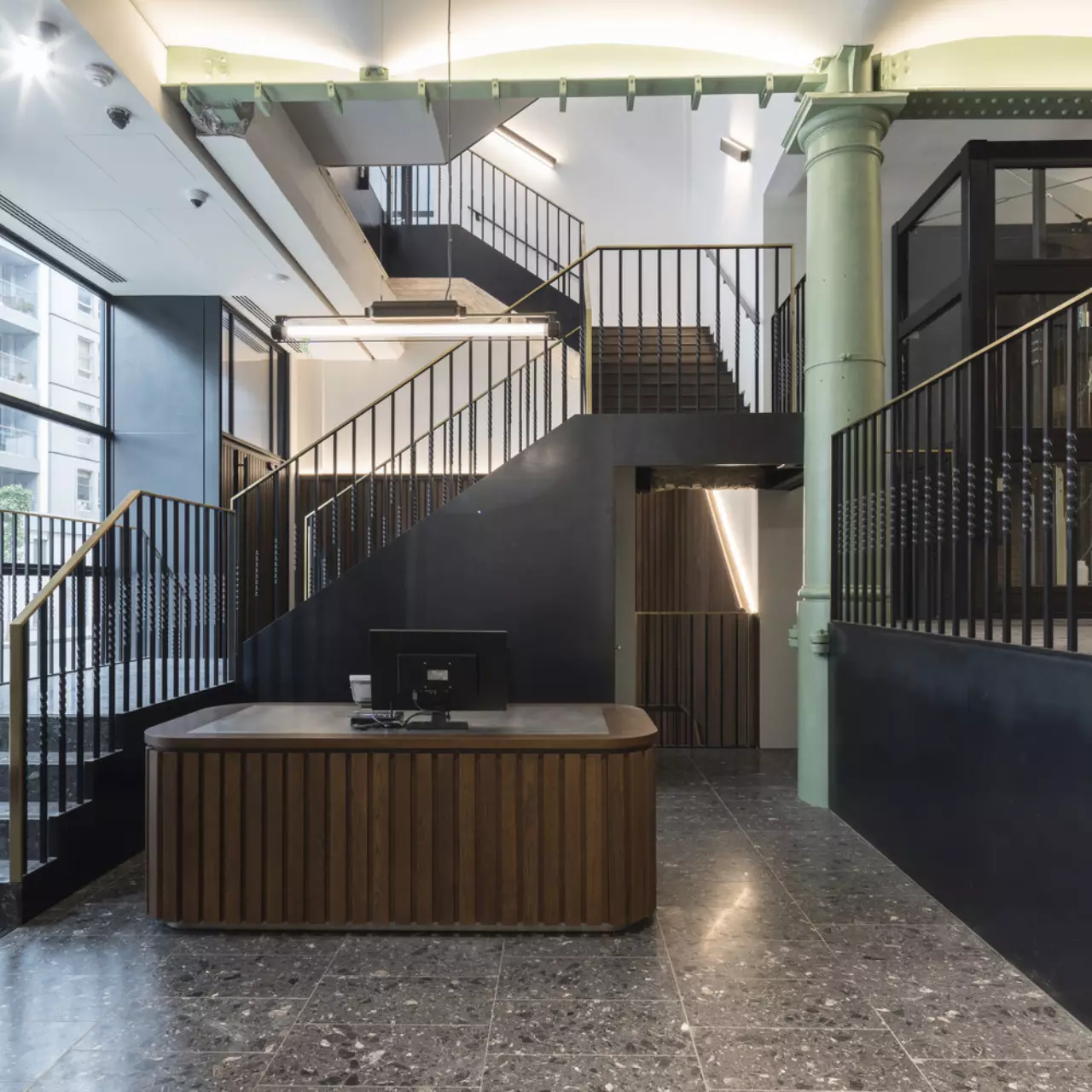
6 – 8 Greencoat Place
SW1
A comprehensive refurbishment at this former six-storey Victorian warehouse completed in June 2021. The entire property has been let to Fora.
Sustainability
- New double-glazed windows to help to retain heat within the building
- All electric heating and cooling which includes highly efficient heat recovery VRF systems
- All lighting is LED and controlled by presence detectors to avoid wasting electricity
- Enhanced sub-metering enables occupiers to monitor their electricity and water consumption
- Renewable electricity tariffs will be used to power the building
- 35 bike spaces and shower facilities allow occupiers to easily cycle to work
Standards
- Achieved EPC B
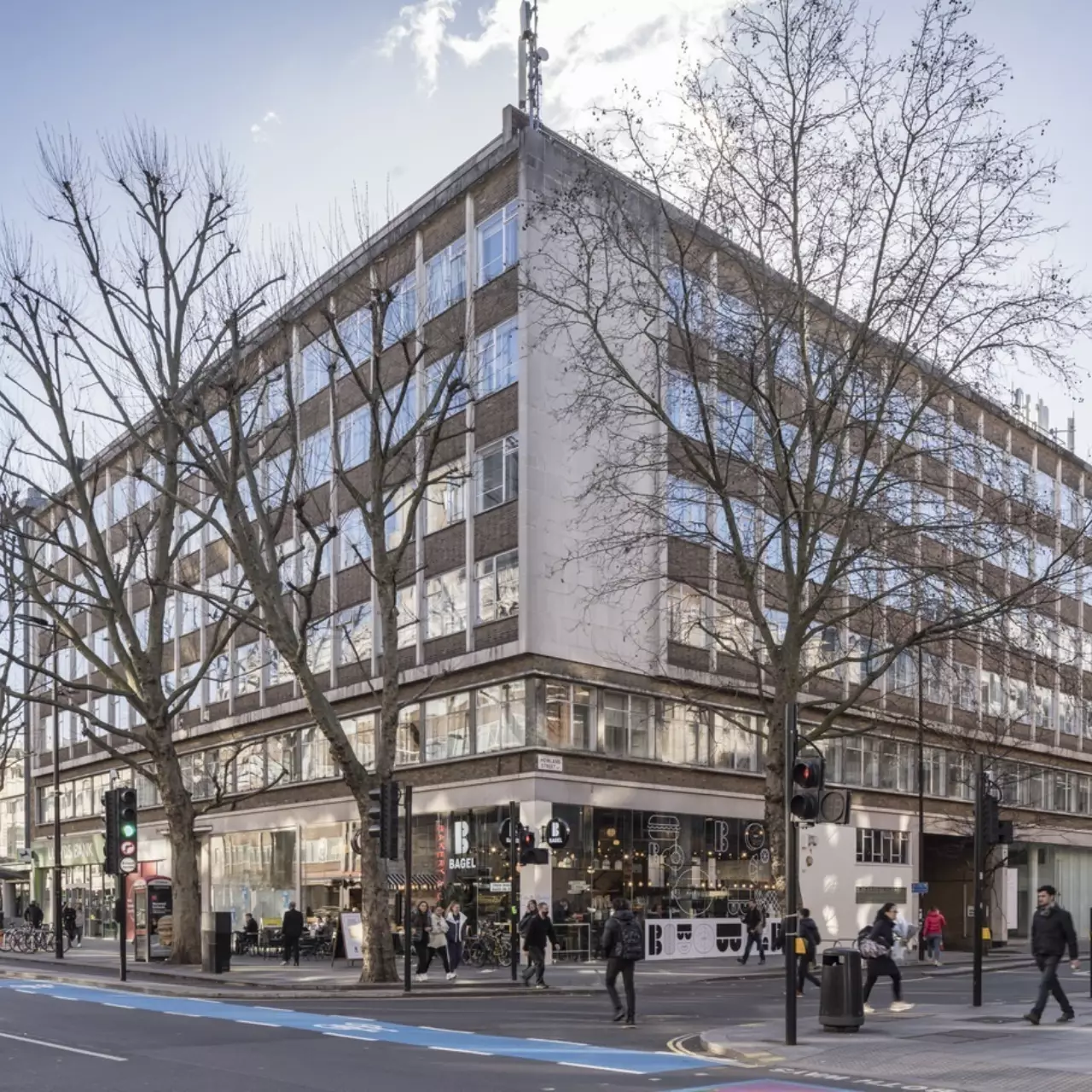
88 – 94 Tottenham Court Road
W1
Multi-let freehold office building. In August 2018, we exchanged contracts on a 36-year leasehold interest acquisition at the property to gain control of the site and, in conjunction with our adjoining ownerships, have the redevelopment potential to increase the floor area from 129,000 sq ft to in excess of 220,000 sq ft.
Sustainability
- All electric
- Air source heat pumps powered by renewable electricity
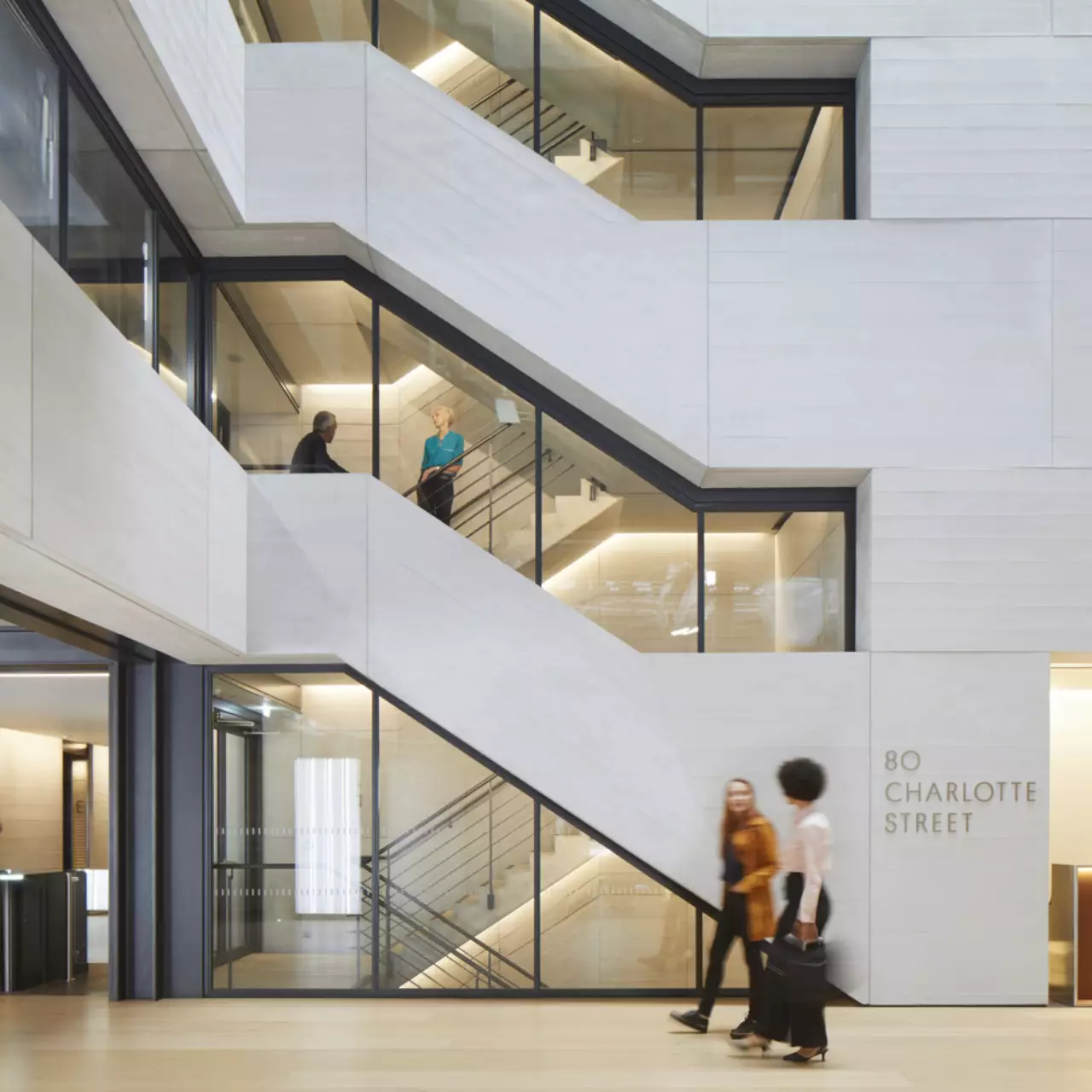
After the embodied carbon of our major developments, one of the biggest slices of our emissions comes from the energy consumed across our portfolio: to heat and cool our occupiers’ workspaces, and to power their lighting, computers, servers and other equipment. These are our Scope 3 emissions – they occur within our value chain, but we have no direct control over them. Even so, there’s still a lot we can do to help drive them down.
Managed portfolio: All in this together
There is a wealth of opportunity to work with our occupiers to, where necessary, influence their thinking and behaviour, and encourage good, energy-efficient habits.
Our occupiers are as diverse as our buildings. They range from small creative studios occupying one corner of one floor to blue-chip, global brands leasing entire buildings. We need to engage them all. First, though, we need to understand in detail where they are in their sustainability journeys. Where are they in terms of policies and practices? How can we help them reduce their emissions? Do they have their own pathways towards net zero? And who is driving these changes within their organisations?
In September 2021, we carried out a net zero carbon occupier survey, to get to the heart of what’s happening across our portfolio. The survey gave us a much deeper understanding of where occupiers are in terms of their own energy, water and waste measures, carbon offsetting and employee climate engagement programmes, as well as how best to support them in reducing their overall emissions.
Key findings show that our occupiers support our Net Zero Carbon Pathway and are striving for similar goals. However, they are looking for help and support in a number of areas, such as understanding their emissions, data collection and setting their own targets, as well as influencing employee behaviour and their supply chains.
We are developing a conversation around these issues, starting by refreshing our Green Forums and enabling the sharing of best practice between occupiers and buildings, as well as providing tips and case studies relevant to each property – something that was flagged as a preferred communication method by our survey. We are also working closer than ever with our mechanical and electrical (M&E) contractors to track and monitor the energy demand and performance of occupied buildings against our targets. We are introducing energy project and reporting templates, monthly building meetings, and changes to the M&E contract specification to include environmental performance reduction targets. for more on the net zero carbon occupier survey.
Head here for more on the net zero carbon occupier survey.
Beyond the bricks and mortar – neighbourhoods
London is our home. However, there are two particular neighbourhoods that are close to our heart – Fitzrovia and the ‘Tech Belt’ (between King’s Cross and Whitechapel).
Behind the main thoroughfares that most people see are living, breathing communities where local services, support networks and schools serve local residents. Our focus on these has allowed us to build close bonds and partnerships with our neighbours across each community.
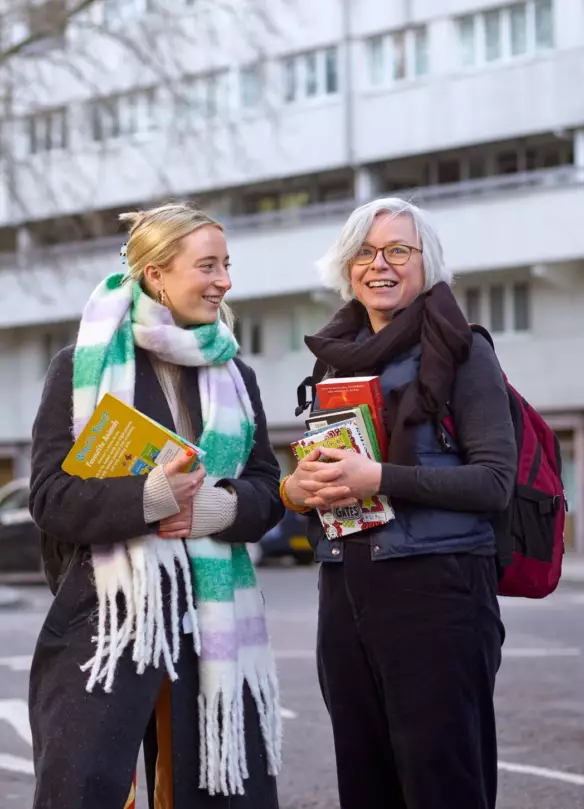
Those relationships often start with our Community Fund, which annually distributes funding to projects chosen for their potential to promote social cohesion, with a focus on community events, environmental improvements, health and wellbeing activities, music and culture, and all sorts of ongoing help for individuals and groups.
The fund allows us to reach out to groups, initially financially and then with other kinds of support such as volunteering, but it’s not a one-way street. The lines of communication we are able to open, and the inputs and advice local groups are able to give us, aid our understanding of what’s needed in the area, and guide much of what we do on the ground. Dozens of organisations, from schools, soup kitchens and sports clubs to playgrounds and theatre groups, have benefited from our support in the nine years the fund has been running.
Community Fund for 2021
projects funded through our Community Fund during 2021

In 2021, our annual fund of £100,000 was divided between 19 projects and, for the second year, provided some core funding to help keep some organisations up and running through the pandemic.
Recipients ranged from a children’s literacy project and a neighbourhood greening initiative in Fitzrovia to a group providing musical and artistic activities for a care home and a cookery school for refugees, migrants and asylum-seekers in the Tech Belt.
We are proud of what our Community Fund has achieved, but we need to make sure it remains fit for purpose. In 2021, we turned to one of the organisations we support through our wider corporate giving programme to help us review our Community Fund processes and refresh our thinking. Over the course of an afternoon in October, Chickenshed, an inclusive youth theatre company worked with us to explore how we could make the application process more open, inclusive and sensitive to the needs of community groups, looking at language, tone and unconscious bias. The no-filter, blue-sky approach of Chickenshed’s Youth Task Force made it an engaging and eye-opening experience that is reshaping the way the Community Fund is managed and administered.
We are looking forward to making changes in 2022 and getting to know all our 2021 Community Fund projects better in the months and years to come.
Doorstep Library
Doorstep Library is a community-focused London charity that brings the joy of books and reading directly into homes who need support, to help children change their own stories for good.
Children who leave primary school unable to read to the required standard face an uphill task in every subject when they reach secondary school. The latest ‘Levelling up’ white paper has brought this into sharp focus and the government has set a national mission to achieve 90% literacy amongst primary school-leavers by 2030, up from the current rate of 65%. Doorstep Library is a community-focused London charity that brings the joy of books and reading directly into homes who need support, to help children change their own stories for good. Doorstep’s volunteers visit families on some of London’s most challenging estates to sit and read with children.
In 2021, Derwent London’s Community Fund supported Doorstep’s neighbouring Church Street and Marylebone Projects. During the pandemic, Doorstep was able to continue its work online and, when regulations allowed, return to in-person reading, often perched on folding stools, literally on doorsteps.
“A huge thank you to Derwent,” says Faith Mowbray, a team leader with Doorstep. “It just felt such a big deal this year to continue to build our relationships with our families, at a time when it’s been incredibly difficult for them and when they’ve been isolated from the things that usually sustain and support them. Having someone helping just matters so much.”

“It just felt such a big deal this year to continue to build our relationships with our families, at a time when it’s been incredibly difficult for them.”
Migrateful
As well as teaching the best recipes from around the world, Migrateful cooking classes help support migrants and refugees rebuild their lives.


ScrollMigrateful “Migrateful’s mission is to empower and celebrate refugees and vulnerable migrants on their journey to employment, independence and integration.”
‘Recipes rebuilding lives’ is the Migrateful motto – and since 2017, the refugees, asylum-seekers and migrants who have arrived at this Clerkenwell kitchen have been gaining precious first steps towards employment, independence and integration, by passing on cookery skills from their countries of origin.
Migrateful helps men and women new to the UK who can’t find work due to legal, linguistic and social barriers – but for whom the kitchen is a refuge. Hailing from up to 25 different countries, after some training, the Migrateful chefs are ready to start offering cookery classes and sharing their culinary culture. Derwent London’s Community Fund grant allowed Migrateful to train 12 new migrant chefs at the cookery school in Clerkenwell.
"Migrateful’s mission is to empower and celebrate refugees and vulnerable migrants on their journey to employment, independence and integration. Our Clerkenwell school aims to be a focal point for the local community. Training new chefs will allow us to plan more classes and bring more participants from all over London and also provide volunteering opportunities for local people." Jess Thompson, CEO & Founder, Migrateful
Chickenshed inclusive theatre
At its purpose-built venue in north London, Chickenshed is an inclusive theatre company for all ages, running successful outreach projects, education courses and membership programmes throughout the year.

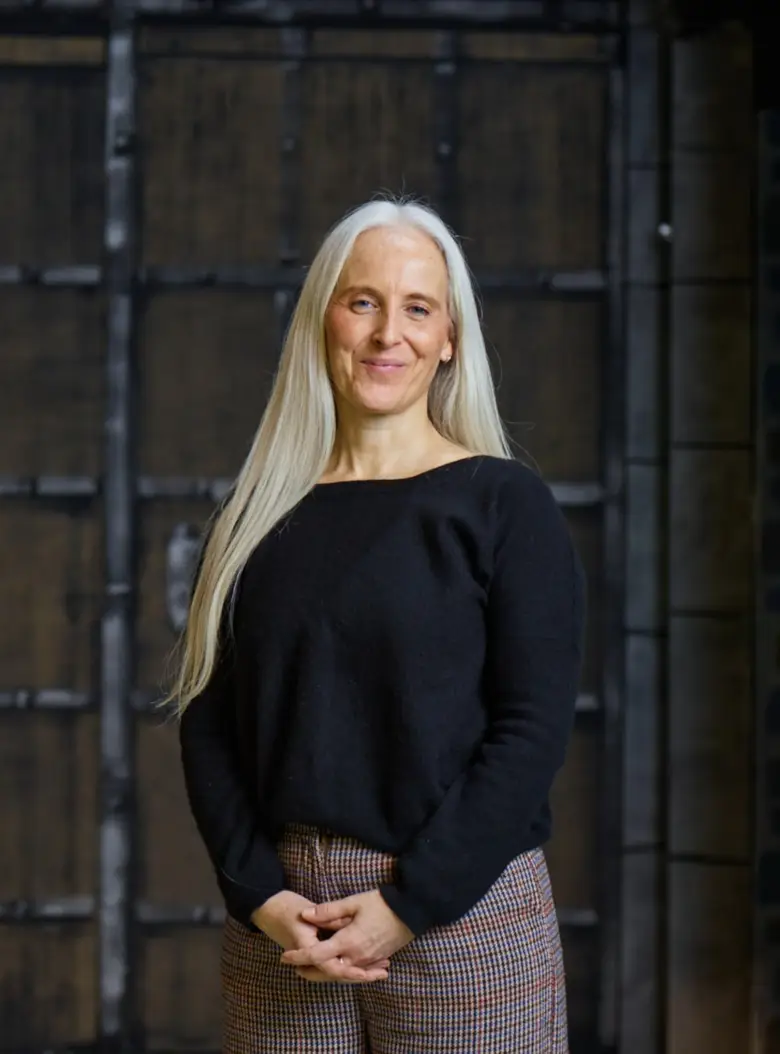
Scroll“Chickenshed's mission is to create entertaining and outstanding theatre that celebrates diversity and inspires positive change.”
Through performance it celebrates diversity, tackles topical social issues and builds skills and confidence, often presenting new work inspired by the people, experiences and events around it. More than 900 local children and young people attend Chickenshed workshops each week, and each year, around 200 young people from all backgrounds have the chance to study formally at Chickenshed, on Level 3, Foundation Degree and BA courses, including many who would not otherwise have the chance to study.
Chickenshed’s work has received support from Derwent London for three years, and we have worked together to provide training for our employees and shape our inclusion and wider ESG agenda. A number of our staff also helped with Living Letters, a project to connect young people with workplace mentors, sharing lived experiences, hopes and concerns, through letter-writing.
“The partnership between Derwent London and Chickenshed has brought positive change and empowerment to the lives of hundreds of children and young people,” says Gemma Kirk, Chickenshed’s Head of Fundraising. “It’s a powerful celebration of the employment of diverse, lived experience as a tool to mentor and empower others, inform inclusive practice and inspire social change”.
Click points on the map
to discover more
Explore our Community Projects
SoapBox in Virtual Reality
Multi-media project co-produced by local young people. Helping to foster creative communities in the area.

All Souls Serve the City
Senior care

Doorstep Library
Children’s literacy project

Holcroft Court
Greening of Carburton Street

Mousetrap Theatre Projects
After school drama club

The Soup Kitchen
Ongoing support of the running of the kitchen and welcomer role
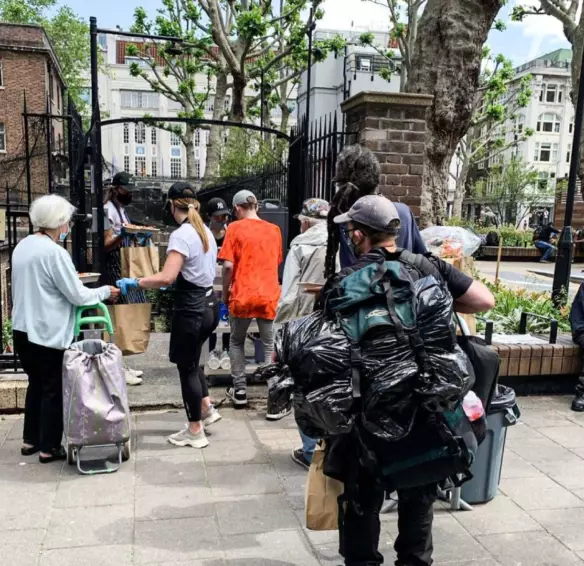
Migrateful
Chef training programme supporting refugees, migrants and asylum seekers

PEER
Art in the Garden

Shadow Heroes
Creating inclusive classrooms by supporting students who have English as an additional language rather than primary language

Society Links
Educational support for children whose education suffered during lockdown

The Spitz
Musical and artistic activities for both care home residents and their carers
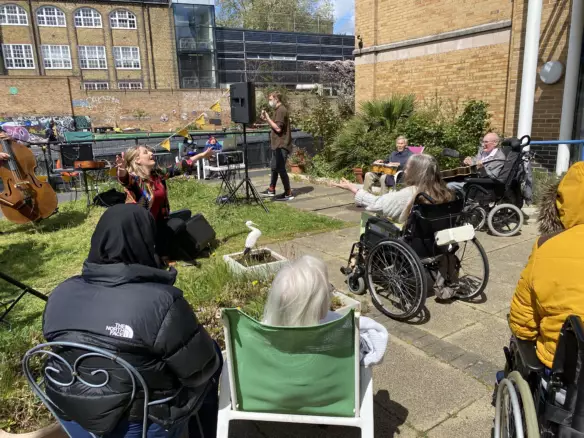
St Hilda’s East Boundary Women’s Project
Core funding

“The women’s project has really helped me progress. When I joined, I was shy and didn’t want to speak to anyone. I started volunteering and ran a cooking session for local women’s – it was so scary! When I started giving out samples of my food, I was amazed that they wanted more and liked the taste so much – it did wonders for my confidence!”
Global Generation
Nature Explorers After School Club

Head Held High
High Society: Online Zoom club for the elderly to reduce isolation.

"High Society has been amazing! It has provided varied entertainment to transport us from our homes via zoom to concerts, interesting talks on London, art appreciation, even an hour with the very entertaining Christopher Biggins and more. It's informative and fun. Long may it last!"
Let Me Know
Healthy relationships and abuse prevention programme
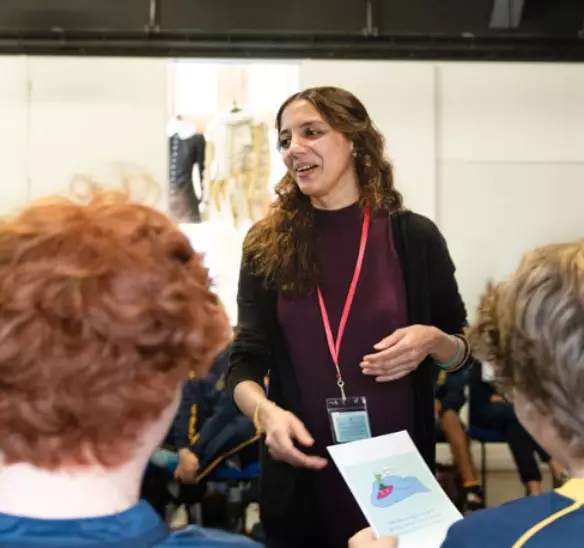
National Youth Theatre of Great Britain
Skills for life through inclusive drama with two Islington schools

Rich Mix Cultural
Pic N Mix: Rich Mix schools film education programme

YMCA London City and North
Young People’s Streets Arts

Fitzrovia Youth in Action
Core Funding


Across our communities, and across the country, this is a time of need. In recent years, Derwent London’s programme of corporate giving has allowed us to contribute to good causes in our sector and communities, with an emphasis on mental health and homelessness.
Corporate giving
In contrast to our Community Fund, which focuses on targeted commitments, corporate giving gives us the freedom to balance instant support for a wide range of small-scale good causes – some identified by Derwent London employees – with longer-term commitments to individuals or larger charitable organisations.
In 2021, our Sponsorship & Donations Committee distributed a budget of around £350,000 across a host of beneficiaries, including:
- LandAid, the property sector charity aimed at ending youth homelessness, towards its development of LandAid House, near Old Street roundabout, as purpose-built accommodation for young people experiencing homelessness. The centre is operated by the YMCA London City and North, whose Young Peoples Street Arts project has also received support from the Community Fund.
- The West End Community Trust’s Get Connected scheme, to reduce lockdown isolation
- Mind, the national mental health charity
- The Parent House, based in Angel, Islington, which supports the needs of parents across the neighbourhood
- Cardboard Citizens, based in Whitechapel, which makes theatre for social change with homeless and ex-homeless people
To help promote diversity and access in property-related higher education, we are also funding two students over the course of their studies. Through the University of Reading’s programme, the ‘Reading Real Estate Foundation’, which supports diversity in the property sector, we are supporting an undergraduate real estate and planning student at Henley Business School. Also in 2021, our full four-year scholarship for UCL’s Bartlett School of Architecture’s new MSci programme entered its second year.
Our people
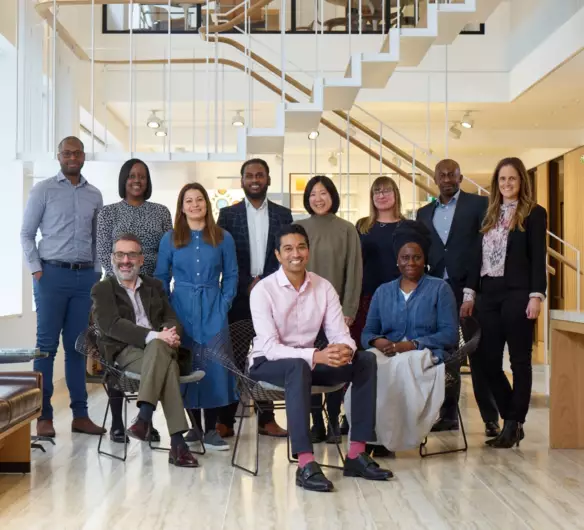
The constantly shifting demands of working amidst a pandemic have made this another challenging year for all our employees. We appreciate that everyone worked extremely hard in difficult conditions, and the company has remained 100% committed to safeguarding and supporting the health and wellbeing of each and every individual.
Our other area of focus in 2021 was on diversity and inclusion, which we strengthened in key areas. We were delighted to achieve the National Equality Standard (NES) accreditation and a place in the top 5% of all companies surveyed. Our fourth biennial employee survey, managed by an independent company and rolled out in October 2021, showed that our culture of openness, inclusivity and collaboration has held strong through the pandemic. At the close of the year, 90.5% of staff reported their overall satisfaction with working for Derwent London.
Health and wellbeing
Through another year that challenged us all in countless ways, we have continued to support our people with a range of benefits and services. At the same time, we have encouraged employees to take a proactive role in their own wellbeing and embedded ‘agile’ ways of working to help them maintain a good work/life balance.
Prior to our return to the office, we updated our Covid safety protocols, and we continue to review these regularly, clearly communicating updates across the company. It was reassuring to hear that 81% of respondents in our latest employee survey believed that the company is ‘committed to ensuring the health and wellbeing of employees’.
Our other health and wellbeing activities include:
- Our occupational health provider gave presentations on topics such as long Covid, vaccines, variants, responsible behaviour, and ways to support others
- The Derwent intranet supported employees with newsletters, podcasts, webinars, as well as links to websites, mental health charities and other services
- Care packages were sent to employees who were either living alone, single parents or in caring roles
- We extended our network of Mental Health First Aid Champions in the workplace (see case study below)
- We provided workshops on both men’s and women’s health
- Our pension providers held a financial wellbeing seminar
- We restarted our social committee in-person events, which help build workplace relationships in a fun, relaxed environment – especially valuable for new joiners
- A series of ‘lunch and learn’ sessions covered topics such as mental health (run by a TED Talks speaker), resilience, and boosting happiness
- We continued to get involved with community projects and volunteering
Employee engagement
Our culture is a core strength of our business. It is rooted in our values – inclusivity, collaboration, and professionalism – which are all essential to the long-term relationships we build with our colleagues and other stakeholders. Our ‘open-door’ policy and belief in face-to-face interaction (we are fortunate that 80% of our employees are based at our head office, 25 Savile Row W1), have helped to create a highly engaged workforce.
Throughout the homeworking periods of 2021, we made every effort to keep our lines of communication open, to help keep our employees positive, connected, and productive, whilst feeling valued and supported.
Our independent, biennial employee survey is a valuable tool for gathering feedback and assessing engagement. The survey of Q4 2021 came at a time that helped us to gauge our employees’ post-lockdown mindset. The 97% response rate, we believe, demonstrates our open culture. The results were equally positive: 94% reported that they are ‘proud to work for Derwent London’, 87% ‘would recommend Derwent London as a great place to work’, and 88% said they ‘enjoy their day-to-day role’.
Throughout 2021, our CEO’s virtual monthly townhalls, supported by Directors and our Head of HR, provided employees with updates on strategy, performance, and initiatives, as well as Q&A sessions, team presentations and several excellent guest speakers. These will continue as 96% of survey respondents said they found the townhalls useful, and 80% said they feel ‘adequately informed about [our] strategic direction’.
Diversity and inclusion
It is so important to us that we create an inclusive workplace in which our people, feel valued and able to make a genuine impact.
Our belief in ‘diversity of thought’ extends diversity beyond the traditional spheres of gender, ethnicity, age and sexual orientation, to include personality, communication and work styles.
Diversity in its broadest sense maximises our creativity and adds value for our stakeholders.
In 2021, we formalised our diversity and inclusion (D&I) vision for the group. Our D&I strategy topped our agenda as we worked towards achieving the National Equality Standard (NES). A comprehensive review by consultants EY of our D&I policies and practices, which was completed in February 2021, included recommendations for improvement, which we subsequently went on to address. In December, we were delighted to be recognised for our commitment to diversity, equality and inclusion by being certified fully compliant with the NES, and among the top 5% of all companies surveyed.
“Derwent London should be immensely proud of their National Equality Standard certification, not only because of their achievement itself but also because they responded to EY’s feedback with absolute rigour and determination, and as a consequence their results are some of the best we have ever witnessed.” Arun Batra, CEO and founder of the UK National Equality Standard.
Our D&I focus in 2021:
- We achieved compliance with the Parker Review in respect of our board ethnic diversity in advance of the 1 January 2024 deadline
- We enhanced our family-friendly policies, including 26 weeks full pay for maternity, adoption and shared parental leave
- In collaboration with the charity Chickenshed, we continued unconscious bias awareness training for all employees
- We continued to nurture a culture of transparency and openness, encouraging employees to raise concerns and speak out about bias or discrimination
- We continued to offer parental transition coaching for employees before, during and after returning from an extended period of leave
- We continued to encourage women into our industry through work experience and mentoring opportunities
- We maintained a diversity dashboard to better understand our own business and check that key talent processes are delivering equitable outcomes for different demographics within Derwent London
- Our Executive Committee attended inclusive leadership training to give them the tools and techniques to manage diverse teams and personalities
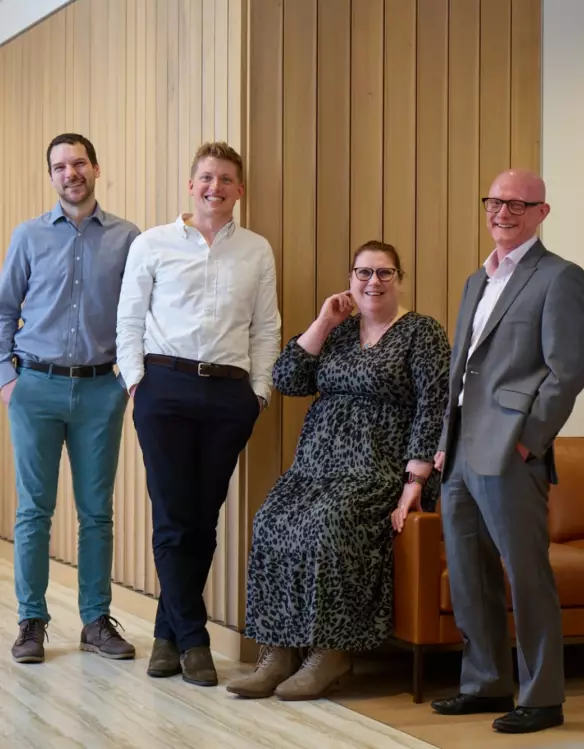
With the rise of 'pandemic fatigue' and its impact on people's day-to-day lives and work, we have been focusing harder than ever on safeguarding the health and wellbeing of our people. By the close of 2021, we had trained 18 of our employees to support their colleagues as Mental Health First Aid (MHFA) Champions.
Our champions are present in all teams, right across the business, armed with the tools and skills to open a dialogue with colleagues about mental health issues, and promote early intervention if necessary. Together, they are raising awareness and helping reduce the stigma around mental health.
Through a mix of group activities, presentations and discussions, our MHFA Champions are equipped with:
- An understanding of common mental health issues
- The knowledge and confidence to advocate for mental health awareness
- The ability to spot signs of mental ill health
- The skills to support positive wellbeing
In 2022, our ambition is to go further, and roll out mental health awareness training across the company.
Health & safety
Health and safety at Derwent London is much more than sets of rules and regulations to be enforced. In recent years, we have developed a health and safety culture that is inclusive and enabling, in which everyone in the business is equipped with the skills and knowledge to do their job in the safest, healthiest manner. The ‘Derwent Way’, introduced in 2020, crystallises our approach for everyone to understand.
Supporting that open and transparent culture, our new compliance system provides a platform for building managers across our portfolio to log and record their health and safety performance. We are now sharing that data with other property companies via a benchmarking group that Derwent London helped establish with our peers in 2021, aimed at delivering great places to work and reducing risks across our industry.
The Derwent Way
In the past, health and safety has been seen as a matter of rules, regulations and compliance. At Derwent London, we have been on a path of culture change, towards a position of influence and inclusion, instead of just compliance and enforcement. For the good of all our employees, stakeholders and partners, health and safety should be an area in which everyone across the company has skills and knowledge, not just a small minority.
In 2020, we crystallised this change by introducing the Derwent Way, a formal expression of how we provide best-practice procedures and communicate our inclusive health and safety culture, and its objectives, to all our stakeholders. At its heart are two key commitments:
1 – To provide healthy, safe and secure environments for our people, customers and contractors to work, live, visit and relax.
2 – Our employees are fundamental to the success of our business, which is why we invest to ensure healthy and safe work environments.
Our portfolio
The health and safety team works with our property managers to ensure that everyone working and living in and around our buildings are kept safe and healthy. It is important that we have a complete picture of compliance across all our buildings, at all times. The new health and safety compliance platform introduced in 2021 gives us exactly that. It provides a depository for health and safety documentation for every building in the portfolio and allows our team and all our building managers quick and easy scrutiny of compliance at every property. Since the new system was adopted, compliance performance across the portfolio has remained above 96%.
We can also now compare the health and safety performance of our portfolio with that of other property companies. In 2021, we led the formation of a benchmarking group that allows us and a number of our peers to share their data with each other for the first time, and to make more meaningful comparisons than solely with contractors – whose data was the only kind previously available to us.
Also in 2021:
- We introduced regular online ‘safety surgeries’ for our building managers to touch base with our health and safety team and get answers to questions.
- We continued to evolve our fire safety management system in line with BS 9997, meeting the requirements of the new Fire Safety and Building Safety Acts expected to be introduced by the end of 2022.
- We continued to review the physical wellbeing factors in our buildings – lighting, air and water quality – and made improvements where needed.
Our developments
We consider health, safety and wellbeing at every stage of a building’s life-cycle, from acquisition through development, to management, leasing and disposal. This means working collaboratively with our teams to design, build, maintain and operate our buildings using best practices.
Our sites continued to follow the Construction Leadership Council’s Covid-19 Site Operating Procedures, and levels of infections on our sites remained relatively low. Without the collaboration with our contractors and supply chain, this would not have been possible. Our strong, collective response managed to mitigate the risks generated by the pandemic.
Also in 2021, we continued to raise the prominence of health issues on our construction projects, attributing to them the same importance as safety. To help tackle some of these issues we supported the Health and Safety Executive’s (HSE) campaigns on mental health, musculoskeletal disorders, and respiratory health.
Our people
In line with our inclusive ethos, we keep our employees up to date on health and safety issues with regular training. In 2021, employees attended external training courses covering topics such as NEBOSH, IOSH, mental health first aid, water hygiene and tall-building fire management. We also continued to roll out new training to our property management and development teams, and in response to the mental health impacts of the pandemic, we trained 18 colleagues as Mental Health First Aiders.
Further training will follow in 2022, with a greater emphasis on wellbeing, mental health and resilience.
Head here for our health and safety basis of reporting and health and safety data.

Governance
Setting the course
At Derwent London, corporate governance is not seen as simply an exercise in compliance. To us, it is an evolving, core discipline which generates value for our stakeholders and underpins our success.
The oversight of ESG (environmental, social and governance) matters is vital. It not only allows the Board to understand holistically the impact of its decisions on key stakeholders and the environment, but also identifies any significant changes in the market. Emerging trends and risks, for example, can be understood and factored into strategy discussions. ESG is overseen principally by the Board, the Responsible Business Committee and the Sustainability Committee.
Climate change governance
The governance of climate change risk and opportunities is ultimately the responsibility of the Board, but day-to-day management is the role of the Executive Committee and senior management.
The Board monitors the Group’s progress through our science-based targets, which were independently validated and approved by the Science-Based Target initiative (SBTi) in 2019. Our environmental performance data is externally assured by Deloitte LLP and, for 2021, our Scope 1, 2 and 3 greenhouse gas emissions data, intensity ratios and energy data received ‘Public Reasonable Assurance’.
Our strategy and targets for energy consumption and carbon emissions are set and monitored by the Board. The Board, Responsible Business Committee and Executive Committee receive regular updates and presentations on environmental and sustainability performance from our Head of Sustainability.
Executive director bonus dependent upon climate-related targets
Green finance governance
Our Green Finance Framework gives us the ability to clearly link our financing to the environmental benefits generated by our activities. The Audit Committee receives annual updates on our green finance initiatives, as well as our reporting disclosures.
Our Green Finance Framework received independent assurance from Deloitte LLP that its application aligns with the Loan Market Association’s Extended Green Loan Principles; the complete assurance statement is available on our website.
Responsible payment practices
As a signatory to the Chartered Institute of Credit Management (CICM) Prompt Payment Code, Derwent London is committed to best practice payment practices and the fair and equal treatment of suppliers. We are clear about our payment practices: unless otherwise stated, we aim to pay our suppliers within 30 days, or otherwise in accordance with specified contract conditions.
To support our supply chain, we worked to cut the average time to payment from 25 days in 2019 to 20 days in 2021. To provide extra help during the pandemic, we aided supplier cash flow with early partial release of retention and contributions to additional costs caused by the delays. We expect our suppliers to adopt similar practices across their own supply chains to ensure fair and prompt treatment for all creditors.
The average time for payment to suppliers
Supply chain governance
We are one of the first clients in the UK to require our supply chain partners to follow the Common Assessment Standard (CAS), which was developed by Build UK with the support of the Civil Engineering Contractors Association (CECA). CAS’s aim is to improve supply chain efficiency and reduce supply chain risks by helping contractors achieve compliance in 12 key areas of risk management, including health and safety, equality and social responsibility.
All suppliers with whom we spend more than £20,000 per annum are required to provide evidence of how they are complying with our Supply Chain Responsibility Standard (SCRS), which sets out our principles and expectations in terms of the environmental, social, ethical and governance issues which relate to our supply chains. We are fully committed to ensuring our supply chain remains as engaged as we are in setting the highest standards.
In August 2021, we extended the SCRS to include our expectations in respect of diversity and inclusion, environmental issues, and preventing modern slavery. On diversity and inclusion, the SCRS extends beyond basic compliance and requires suppliers to show how diversity and inclusion are embedded in their working practices.
Human rights and modern slavery
The protection of human rights and fundamental freedoms is a key ESG priority that we manage from within our business and externally, across our supply chain.
Our ongoing risk assessment indicates that the risk of any slavery or human trafficking in respect of our employees is low. In our supply chain, the greatest potential risk exists in the use of building contractors for our development schemes, as their work involves the use of subcontractors. The same risk exists in some of the companies that provide Derwent London with services such as cleaning and security. We make sure all of these suppliers are aware of the Modern Slavery Act 2015 and require them to formally confirm their compliance with the legislation. We monitor and cross-check our supply chain, from procurement to delivery.

Of employees confirmed they would feel able to speak up
Employee helpline for anonymous reporting of concerns
Honesty and integrity are fundamental to the way we do business. It is our duty to identify any malpractice within or affecting the Company, and to root it out. Our employees share those high standards and are encouraged to speak out if they witness any wrongdoing.
Our whistleblowing procedures are set out in our employee handbook, on our Group intranet and on staff noticeboards. We have an independent telephone line and online portal for anonymous reporting of concerns, and our Senior Independent Director provides a point of contact for whistleblowing matters.
During 2021, the Group migrated to a new whistleblowing system provider, and rolled out new arrangements to all employees, including our building management teams. In the 2021 employee survey, 84% of employees confirmed they would feel able to speak up if they witnessed or experienced behaviour that didn’t line up with our culture and policies – an encouraging figure, but we continue to aim for 100%. That is why we have set ‘Wrongdoing and the reporting of concerns’ as the topic for Q1 2022 on our mandatory compliance training programme.
The Board is updated by the Company Secretary on the operation of the whistleblowing system, and we have procedures for meeting any whistleblowing message with an independent and proportionate investigation. In 2021, as in 2020, the system received no whistleblowing messages. Thanks to the ‘open door’ nature of our business, concerns are often raised directly with management, the CEO or HR team, and investigated appropriately.
Tax governance
We take our obligations as a taxpayer seriously and make sure we have the governance and risk management processes in place to meet our wide range of tax obligations. Our Statement of tax principles, approved by the Board, is available on our website.
We have an open and transparent relationship with HMRC that allows us to intercept any tax risks at an early stage and clarify areas of uncertainty. We keep HMRC informed of how our business is structured and respond to all questions or requests promptly.
Case study
Chamberlaine, one of London’s leading contract cleaning companies, understands the importance for Derwent London of working with suppliers who are aligned to our ESG principles.
Chamberlaine Cleaning Services
The company is a long-standing supplier to Derwent London and currently operates in 26 of our buildings, including the Brunel Building W2, White Collar Factory EC1 and 1-2 Stephen Street W1.
Sustainability and a circular economy are not new concepts for Chamberlaine; they are the cornerstone of their business model. The Green Apple Award for environmental best practice that the company received in 2021 recognises the work it has done in the past 10 years to become one of the market leaders for environmental performance in cleaning.
Chamberlaine’s approach is one of collaboration and innovation, putting care for the environment and the community at the heart of everything it does. Its journey of change began in 2008, when it reduced its chemical usage by introducing concentrated cleaning products, reusable bottles and pre-measured dosing caps. This eventually led to its introduction in 2018 of chemical-free cleaning and technology that is now used throughout our portfolio. For Chamberlaine, doing the right thing for the environment is always the right option, even when it is not the cheapest.
“Our service partners have been selected based on the quality of the service they provide, alignment of their environmental and sustainability credentials to our own, and desire to work collaboratively to share the latest innovations” Terry Sullivan, Managing Director, Chamberlaine Cleaning Services
